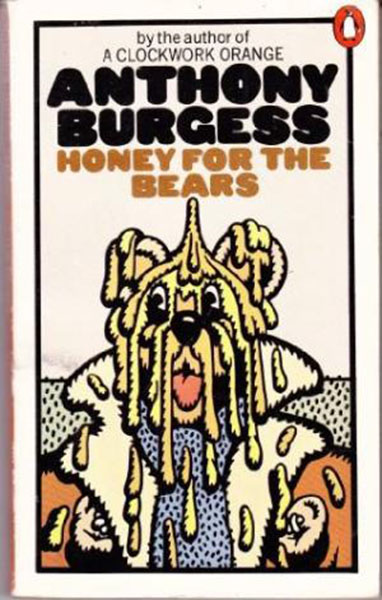Though clearly not a gay writer, the prolific Anthony Burgess (1917-93) recurrently focused on gay characters and/or Brits who struck non-Brits as homosexual (both in his Malaya trilogy The Long Day Wanes).

I enjoyed Burgess’s (1963) Cold War farce, Honey for the Bears, more than One Hand Clapping. British antique shop owner Paul Hussey is buffeted around, first on an ocean liner headed for Leningrad, accompanied by his American wife, Belinda, then in Leningrad by (secret?) police agents, Zverkov and Karamzin, and Alexei Prutkof, a would-be hipster born in Brooklyn, fluent in English, working as a guide, mostly in the Hermitage. Paul’s plan to sell twenty dozen brightly colored dresses made of synthetic material (“drilon”) go awry, and what money he made selling one or two at a time was consumed by Alexei, either in the form of vodka or in paying off his overdue rent for the apartment in which Paul hides out.
Belinda was confined to their cabin with a rash en route, and falls into the long-term care of a female Soviet physician, Sonya, who at the end is taken her along to a new posting in the Crimea.
Paul had homosexual experiences during the war with a fellow RAF flyer (Robert) and homosexual desires mostly latent since then (without strong heterosexual ones, either…) emerge when he is very drunk at a party (after losing interest in raping Alexei’s resident girlfriend, Anna).
Since he has a double passport and a return ticket for two to Helsinki, it is arranged for him to smuggle a strapping young man whom he is told is the son of the persecuted Shostakovich-like composer Opiskin) out of the country in drag (and silence, except for giggles, since the lad speaks no English). In Helsinki, the Soviet policemen claim that the youth is a wanted gangster and Opiskin. Before the Internet age, Paul cannot easily check that, and is uncertain at the end about whom he has helped, as well as about his own sexual orientation, given what he was told he had done at Alexei’s party and his lack of libido in regard to his wife and to Anna.
Paul’s cultural capital includes quoting from T. S. Eliot plays and Gerald Monley Hopkins poetry. I think that at the end he has five hundred pounds from the second smuggling venture (Opiskin), though he will need new false teeth, the fixing powder having been seized as illicit drugs on entering the Soviet Union and the teeth knocked out in a KGB beating.
©2018, Stephen O. Murray

